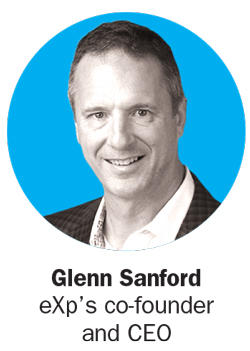
In 2015, eXp Realty CEO Glenn Sanford boarded a 43-foot motor coach and set off from Bellingham, Washington, to barnstorm the country. Over the course of 11 months at “lunch and learn” sessions in hotels, country clubs and local Realtor association offices, Sanford pitched brokers in 28 states (and two Canadian provinces) on the benefits of virtual brokerage.
When the financial crisis hit, Sanford — known for his soft-spoken and laid-back style in an industry full of alpha dogs — was forced to shutter two brokerage offices he was running. The experience prompted him to rethink a business that was dependent on bricks and mortar.
The past few years haven’t been kind to residential brokerages, which have endured a punishing housing slowdown and rising costs of doing business. But eXp and Sanford — who ran a team selling $60 million worth of real estate a year at Keller Williams in the early aughts — are outliers among the bunch.
Since Sanford’s bus tour, eXp has been growing exponentially, even amid a technology reckoning and as a wave of venture-funded players have disrupted the residential brokerage sector.
The company, which Sanford co-founded in 2009, ended 2018 with 15,570 agents — up from 2,401 in 2016. By the end of 2019’s first quarter, that number was already up to nearly 18,000.
“We have come into the world at the right time,” said Mitch Robinson, eXp’s senior vice president of marketing, who previously worked at Expedia and Zillow.
Robinson said many of the agents who join eXp do so because they’re questioning the value of working at traditional firms when they’re doing most of their business outside of their offices. “They’re like, ‘Gee, am I paying out part of my commission to pay for this empty office?’” he said.
Indeed, the financial burden of brick-and-mortar offices has become an existential threat to some firms.
Realogy — the largest real estate conglomerate in the U.S. with brands including the Corcoran Group, Sotheby’s International Realty and Coldwell Banker — has said it’s looking for $70 million a year in savings, in part by reducing its physical footprint. During a recent earnings call, Douglas Elliman also said it would undertake “substantial” cost-cutting in payroll and other areas.
 “I have said all along that the traditional brokerage model is broken,” said Andrew Heiberger, the CEO of the New York firm Town Residential, which shuttered brokerage operations last year.
“I have said all along that the traditional brokerage model is broken,” said Andrew Heiberger, the CEO of the New York firm Town Residential, which shuttered brokerage operations last year.
Heiberger said it was impossible to support the high cost of offices and rising commission payouts. “This seems to be one model that is a fix — especially since splits continue to rise and recruiting costs, rents and salaries are unsustainable if you want to make a profit,” he said.
With 1,664 agents, Florida is the second-largest market for eXp in the U.S. after Texas, according to Andrew Shock, the designated managing broker for the state, who joined eXp two months ago after 16 years at RE/MAX.
Shock said eXp has been in Florida for nine years but only hit the gas on growth two years ago. He said he expects to have 2,000 Florida agents by the end of July, 2,500 by October and 4,000 agents by October 2020.
But while eXp is riding high at the moment, it’s also grappling with high executive turnover and a string of alleged regulatory violations in California. In additional, several prominent critics, including former executives, have suggested that the company’s top agents are more focused on recruiting new brokers than on selling real estate — a fact that, if true, calls into question whether eXp’s model is sustainable.
As the company deals with those growing pains, however, the autonomy eXp affords agents could soon become a liability in South Florida.
Like other high-commission firms, eXp’s gives agents with large, multistate teams the ability to effectively run their own businesses powered by eXp’s platform. In many cases, that’s meant downplaying eXp and playing up the team.
But starting July 1, the Florida Real Estate Commission — which regulates real estate licenses — will require agents to feature the name or logo of their brokerage in all advertising and to make it larger than the team’s name and logo.
Sources said the new rule is designed to reduce consumer confusion. But on the industry side, it will impact teams that operate with relative independence.
“These newer models [like eXp] thrive when it’s been all about the team,” said Beth Butler, president of Compass’ Florida region and the former president and COO of One Sotheby’s International Realty in Miami. “Since these companies have not invested a lot of money in building brand awareness, it will be interesting to see how some of these changes will impact their models.”
Virtual world, real perks
Sanford was one of Keller Williams’ top agents before he launched eXp in Bellingham — nestled between Seattle and Vancouver — 10 years ago.

Images from eXp World, the virtual campus that offers training sessions and other services for the firm’s brokers.
Unlike the heads of many competing tech-focused brokerages, Sanford, who speaks with a slight twang that gives away Bellingham’s proximity to the Canadian border, bootstrapped a cloud-based company with no physical offices. Instead, agents work in a SimCity-style virtual world (dubbed eXp World) populated by avatars.
The display looks a lot like a video game — set on a colorful digitized corporate campus with multiple buildings, offices and even a digital lake. Agents can move their avatars from one location to another, visiting the “transaction management” building, attending virtual training sessions or meeting with executives hanging in their “offices.”
In 2013, eXp went public and began trading as a penny stock on a mid-tier exchange called OTCQB. But in 2018 it was uplisted to Nasdaq and blew away all expectations when it skyrocketed to a $1 billion market cap on its first day of trading. (Its market cap has since dropped; as of late May, it stood at $655.6 million.)
“It’s kitschy until you try it,” said Robinson, referring to eXp World. “Listen, right now I’m sitting in my basement. I haven’t shaved today, and I’ve got two monitors in front of me. A half hour ago I was having an important conversation with our CEO, who was on his boat. I’m more productive and engaged.”
But it’s not just being able to skip a shave or work from a boat that’s luring brokers in.
The firm — which gives agents access to Regus offices around the country for in-person meetings — also offers real-world perks, like company stock and a revenue-sharing program. In addition, agents start at a high 80 percent commission split on their first $80,000 in gross commission income and only have to pay the firm a maximum of $16,000 a year on their commissions.
Keller Williams has been a prime poaching target for eXp.
Although that firm also has profit-sharing — in which agents get a slice of the profits once expenses are paid — eXp agents say they’re pocketing more money because nothing comes off the top.
 The revenue-sharing program at eXp also rewards agents who bring others to the firm, giving them a piece of the revenue generated by agents in their “downline” (as recruits are known).
The revenue-sharing program at eXp also rewards agents who bring others to the firm, giving them a piece of the revenue generated by agents in their “downline” (as recruits are known).
“I could retire today if I want — and that’s in two years,” said Mitch Ribak, who was a broker/owner at Tropical Realty before joining eXp in 2017.
Ribak, who moved to eXp with 40 agents, now counts 400 agents in his downline. That network of agents in 24 states is growing roughly 7 percent a month organically, he said, and that’s with him spending no more than three hours a week recruiting. His own team of 40 has swelled to 70 with about $140 million in sales volume (or 800 deals) last year.
And in June, the firm scored a big win in Florida by recruiting Orlando-based agent Veronica Figueroa and her 17-person team.
The firm’s formula seems to be working on a broader level, too.
At the end of 2019’s first quarter, eXp logged $5.8 billion in sales — up 149 percent year over year. Revenue rose 153 percent to $157 million with a net loss of $6.3 million — down from $10.7 million a year ago.
Though eXp has garnered flashy headlines due to its national growth, it may have a tough time unseating South Florida’s regional brokerage stalwarts.
“The national market allows for large volume but not necessarily large market share,” said Mike Pappas, who owns the South Florida’s Keyes Company, an independent firm with offices stretching from Miami to West Palm Beach.
Pappas said so far this year, there have been 87,000 closed sides — meaning the buy or sell side of a deal — in the South Florida market. Of them, eXp closed 457 sides, he said. (For eXp, the average deal size was $300,000, compared to the industry average of $394,000.)
But eXp’s Shock disputed the notion that eXp only has a small piece of the market share and touted the firm’s model.
“It’s really the only model where the agents are their own boss,” he said. “They’re shareholders of the company they work for; they drive the growth of the company in an indirect way.”

And Pappas said he’s acutely aware that firms like eXp, Redfin and Compass are changing the brokerage landscape. “We’d be foolish not to be paying attention to all the shifts in today’s market,” said Pappas, who is investing more money in technology, artificial intelligence and post-closing services to buyers.
As Keyes’ leases come up for renewal, Pappas said he is looking at smaller spaces but will not close offices. “We have found that when we eliminate an office, you lose the market,” he said.
Agents focusing on luxury sales argue that offices are still key and said not having any is one of eXp’s distinct disadvantages.
“The customer experience is a huge thing — especially with luxury,” said Samantha Friedman, an agent with Keller Williams in Palm Beach. “We still have offices where people want to go, which I find is a big deal.”
According to Compass’ Butler, top-producing agents still stick with full-service firms. She cited two existing firms that offer high commission splits — Beachfront Realty, in Aventura, which gives agents a 90 percent split, and Florida Realty of Miami, a 100 percent commission firm. Although the latter has 1,500 agents, Butler said many do just a handful of deals each year — making it an ideal place for agents who work part time or simply need a place to hang their license.
“In spite of these new models coming up, top-producing agents still gravitate toward a full-service model,” she said.
But Ribak argued that eXp offers him instant support, particularly with IT issues, which he never had before.
“Other companies are bashing the heck out of us because they’re trying to keep their agents,” he said, noting that in Broward County — near Orlando — eXp is the No. 2 by agent count.
“We’re not just bringing on bodies,” he said. “We’re bringing on people that really want to build a business… We look for agents that are looking for us.”
Annuity for agents
As eXp’s star rises nationally, traditional firms have seen their margins shrink.
In May, Realogy’s market cap plunged to $827 million, dipping below the $1 billion marker for the first time since the company went public seven years ago. Just one year earlier, the company was valued at $3.3 billion — which itself was down from a high of $7.4 billion in 2013.

Images from eXp World, the virtual campus that offers training sessions and other services for the firm’s brokers.
“In today’s environment, people like to work more remotely and more mobile,” said Realogy CFO Charlotte Simonelli, during a first quarter earnings call in which she detailed the plan to reevaluate its physical footprint.
Clelia Peters — president of the New York-based firm Warburg Realty and co-founder of MetaProp, a real estate tech accelerator and investor — said brokers seem to be “into” the entirely virtual system.
“Everyone talks so much about Compass, but eXp is a far more innovative company in so many different ways,” Peters said. “They’ve set out to solve some of the ills of brokerage in that they’re significantly reducing overhead costs, and they’re trying to create almost an annuity for their brokers — a longer-term, more predictable and sustainable opportunity with a passive income stream.”
Last year, analyst Tom White at financial services firm D.A. Davidson crunched the numbers and found that a mid-tier agent at eXp can net around 22 percent more gross commission income than a counterpart at a competing firm. (White, who is not connected to the firm, analyzed data from eXp, Berkshire Hathaway HomeServices, Re/Max, Century 21 and Keller Williams.) In some cases, eXp agents retain as much as 36 percent more, he found.
And the company isn’t the only virtual brokerage trying to disrupt the terrain.
Fathom Realty, a Dallas-based virtual brokerage with 2,724 agents, announced in March that it plans to file for an IPO. And Purplebricks, a discount brokerage with no physical offices, has tried to expand beyond its roots in the U.K. The firm — which launched in the U.S. in 2017 — has, however, faced hurdles. It shuttered its Australia operation in May and announced plans to review its U.S. operations.
K.P. Reddy of Shadow Ventures, a venture-capital firm in Atlanta, said that many brokerages building tech tools recognize that being mobile is “pretty much a given.” But he said a good number of incumbents are still in denial.
“It’s very much like, ‘These are all great tools that can make us more efficient,’” he said. “I don’t think they think these tools will evolve and change how they do business.”
Although a slew of AI-powered firms may one day cut out the broker entirely, eXp is not saying the industry doesn’t need agents, he added. “They’re saying, ‘Let’s reduce the very high costs of office space, the office manager and drain of resources,’” Reddy said. “If you can do it better without those things, it’s a great iterative move.”
Animal Farm?
Despite the eXp buzz, the firm has landed in the crosshairs of one prominent critic: Gary Keller.
The founder of Keller Williams, the massive franchise brokerage with 159,000 agents, has derided eXp’s virtual world as an “animal farm” built on “old game technology.”
Keller has good reason to be upset. His firm has been hit hardest by eXp’s growth — partly because of Sanford’s roots at the brokerage but also because both companies reward agents for recruiting colleagues and give them a slice of the profits (or revenue).
“You know you have got under a competitor’s CEO skin when they can’t help calling one of our underlying technologies an Animal Farm and has to resort to calling it Donkey Kong now that we own it,” Sanford tweeted in January in response to Keller’s critique. (Sanford was not available to be interviewed for this story).
But eXp has faced challenges in recent months as it’s grappled with agent oversight and international expansion.
The California Department of Real Estate has launched probes into alleged eXp violations related to licensure and advertising.
And even for a fast-growing startup, eXp has seen significant executive turnover.
In May, Scott Petronis, the firm’s chief technology officer, left to join Redefy, a flat-free brokerage based in Denver. COO Mary Frances Coleman left in January, and Vikki Bartholomae, the firm’s president, departed in November to join Side, a tech-focused brokerage that targets top producers.
“You have a company that has very high ambitions and a CEO who’s got to have it his way,” one industry observer said. “Glenn is an autocrat; he gives very little latitude to senior executives to make decisions.”
But Sanford’s lofty dream of transforming residential brokerage has also been an asset.
“So much of the industry is sort of lemmings-esque,” said Russ Cofano, a former executive at Move, parent company to Realtor.com. “They don’t want to stray too far away from what everyone else is doing. Glenn was very different in that regard.”
However, Cofano — who met Sanford at a Move broker advisory board meeting and joined eXp a few years later, serving as president and general counsel in 2016 and 2017 — said he himself hit a wall after about a year attempting to take eXp “from startup to enterprise.”
“Glenn believes in what’s called a holacracy model of management,” where ideas bubble up from within the company, he said. “He didn’t want any one person or group of people [in] control.”
Although the strategy empowered agents, Cofano ultimately didn’t buy into that style, particularly for a public company with shareholders.
And, he said, as time went on, he had nagging concerns that some of the highest-paid people were making money off of recruiting — not off of selling real estate. “I thought that wasn’t going to be a sustainable value proposition,” he said.
In addition, eXp has failed to capture significant market share in major metro areas that it’s already in, such as Los Angeles and Miami.
Earlier this year, Stephen Sheldon, an analyst at investment bank and financial service firm William Blair, raised concerns about eXp’s margins. “Gross margins were below our estimate, driven by both the impact of highly productive agents reaching their commission [caps] earlier in the year and lower fees given higher agent turnover the past few quarters,” he wrote.
More recently, the company has stated that its goal is to pay out no more than 50 percent of earnings to agents.
But executives at eXp say these hurdles are to be expected for a fast-growing firm.
Shock of eXp admitted the competition in Florida has been “stiff.” But he said the industry is evolving at a rapid clip with more pieces of the transaction available online.
“The same people that are booing us are the same people who will either have to join us or find a better way of doing things in the future,” he said.
